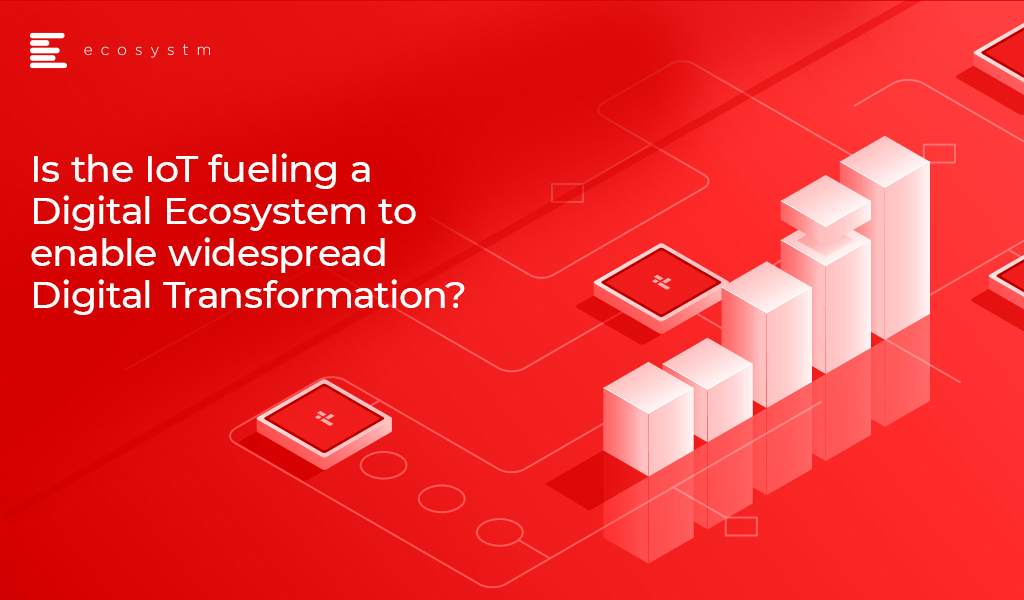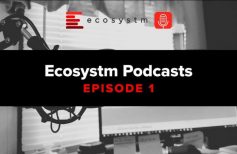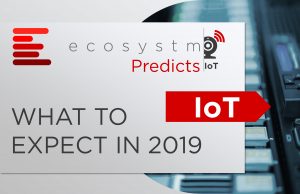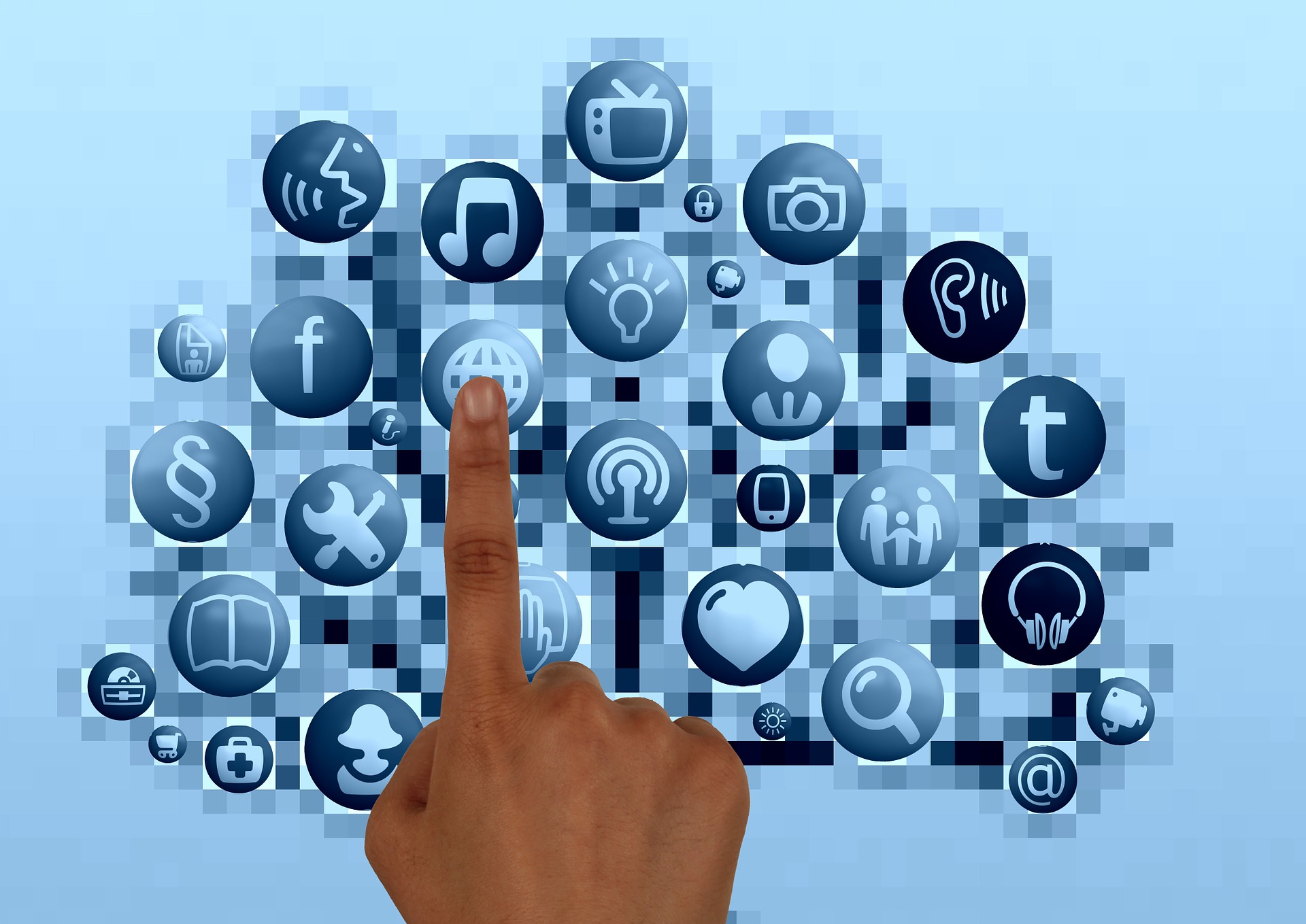
Is the IoT fueling a Digital Ecosystem to enable widespread Digital Transformation?
Ready or not, digital transformation (DX) is here and is already revealing its impact on every aspect of our lives. In some cases, the transformation is obvious. Take the way we call for a ride-share or taxi, find a room to stay, or chat to a robot for your favourite song – these are all part of mainstream DX. More subtle examples, with a Digital Ecosystem working behind the scenes, can be found in things like checking out at the retail store without ever opening your wallet or jumping into the latest automobile and getting your directions mapped out for you.
DX is often described as the integration of digital technology into all areas of business while changing how you operate and deliver value to customers. Advancements involving cloud computing, analytics, social and mobile technologies are reshaping the customer experience (CX) and opening the door for innovation and new business services. DX is also a cultural change that requires organisations to continually experiment with new ideas while being comfortable with failure and accepting that speed has become a business imperative for everyone.
DX will fundamentally change the way we think about creating a product and how we take it to market. Gone are the days of ‘make and sell’— that is, finding a market (after the fact) for the latest bright and shiny invention or innovation and forgetting about the “thing” that’s left behind with the customer. We have flipped from building stagnant technology-for-technology’s sake, as well as having little or no real-time information about most of the product’s lifecycle, to now creating customer-centric solutions teeming with data about everything at all times.
What’s fueling this major shift? The widespread connection of things to the Internet that had never been connected before, including machine-to-machine connectivity. All thanks to embedded smart sensors making IoT an omnipresent phenomenon. By 2025 there will be over 80 billion ‘things’ connected to the Internet which in turn will provide input to feed digitally transformed companies. Industrial business models everywhere will also flip to a ‘sense and respond’ environment where customers and suppliers will know almost everything there is to know about the service or product being sold and delivered to us (within the realms of data privacy regulations).
The Emergence of the Digital Exchange
In the midst of this DX there is vast opportunity: a new customer engagement model to make things better and easier for everyone. Digital businesses cannot be built and serviced by a single supplier – it’s just too complex. There are too many new sources of IoT data that are used to feed business systems and to drive outcomes. Instead, we are seeing businesses that serve the same set of customers from consortia or digital ecosystems or digital exchanges made up of a wide range of participants with an equally wide range of talents and needs.
As more companies become digital, we expect that there will be thousands of ecosystems in existence across every industry. In this collaborative environment, companies with a mutual interest in a particular industry — sometimes crossing traditional industry lines — will join a digital exchange whereby they can openly innovate and scale their business by tapping in to a global community. Just think of the power and value of the exchange as being similar to the network effect (something like Metcalfe’s Law) whereby the more the participants engage in activities in the exchange, the more value everyone gets out of the digital exchange. Microsoft’s Satya Nadella calls this “creating more surplus outside us.”
Some of the key benefits we can expect from the digital exchange are:
- Co-innovation between startups looking for partners and established vendors looking for external ideas for product improvement
- Collaboration to solve like-minded industry challenges
- Creation of open and interoperable tools to speed up new products and services offerings
- Ability to leverage a large and diverse set of partners who can help each other discover new markets and services within their own industry and beyond
Digital exchanges can be wild and confusing, and they may seem disorganised to the newcomer. Think of the first impression you have when you walk into a large open-air market selling antiques. Initially everything seems to be piled into stalls with no logical reason. However, to the experienced shopper and stall owner, there is an organised manner to it that makes sense. And there are many wonderful things waiting to be revealed.
At this year’s Hannover Messe an original example of a digital exchange was rolled out by Schneider Electric called Schneider Electric Exchange — their digital ecosystem and business platform. Schneider Electric Exchange also has a structure to it that is geared up to help specific roles or personas and make it easier for anyone to find the right partner for solving specific business challenges. It is also set up to step someone through the life-cycle process of creating a solution by connecting them to the right tools with the right partners for the right markets. Business value can be created within the Exchange but is equally powerful outside when delivered to the end user. For example, building management designers can use Schneider Electric Exchange to find partners who are also experts of emerging technologies such as digital twins, 3D-Print, AR, and analytics.
We believe that digital exchanges will create immediate economic benefits by reducing friction and inefficiencies in the overall customer supply chain. Participants will be able to innovate faster and deliver quicker — even as customers’ experiences and expectations rise, evolve, and change at the lightning pace of the digital economy. Over time we expect that vendors’ Net Promoter Score (NPS) to rise as a result of improved business processes from these exchanges.
In conclusion, IoT will be the pebble that creates the ripple in the DX pond. Data will be created from every sensor that will be used to create competitive differences at every stage of a company’s value chain. Businesses that do not embrace the use of the data and innovate themselves as well as their products do run the risk of being very quickly disrupted. Companies also do not have the financial and technical resources to do all of this by themselves – hence, the opportunity to be part of a digital exchange is the way to be agile, cost-effective, and competitive. Every time, businesses that waited while a new ‘industrial revolution’ was taking place, lost out. Today, who will dare to disrupt instead of being disrupted? We are at the tipping point of digital transformation and there is no time left to sit on the sidelines – businesses need to jump in to a dynamic digital ecosystem and partner with each other through their industry’s digital exchange!






